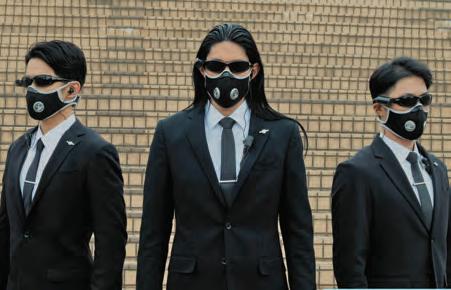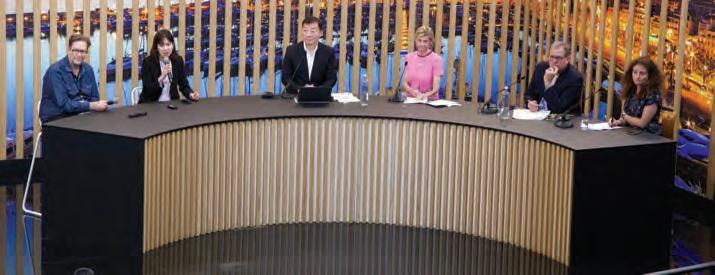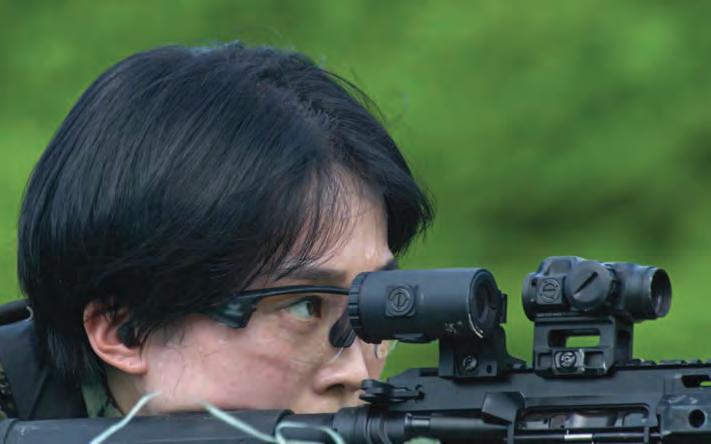






Budget restrictions are making entertainment formats an especially safe, reliable option for broadcasters and platforms in need of locally resonant content.
Leading distributors share their perspectives on the latest trends in entertainment format rollouts, from the rising interest in strategic gameplay to the crucial need to build out brand extensions across multiple touchpoints.
Ricardo Seguin Guise Publisher
Mansha Daswani Editor-in-Chief
Jamie Stalcup Managing Editor
Kloudia Sakowski Associate Editor David Diehl Production & Design Director
Simon Weaver Online Director
Dana Mattison Sales & Marketing Director
Genovick Acevedo Sales & Marketing Manager
Ute Schwemmer Bookkeeper
That was the topline upbeat news in my formats survey in this edition, which features input from a mix of executives about what’s dominating in entertainment. “In this landscape, proven formats can cut through—this environment favors formats that are repeatable, returnable and internationally scalable,” Fremantle’s Vasha Wallace told me.
The disclaimer to the good news is that getting a new concept away is proving to be much harder today as programmers retrench toward the safety of brands they know audiences love. So, brushing up your franchise management chops is absolutely crucial, ensuring your big shows return and you can build out entire universes to support fandom. Just look at IPs like The Traitors, which has a live experience, and ITV Studios’ juggernaut Love Island, which had a huge summer in the U.S. ahead of the launch of the World of Love Island FAST channel on Prime Video.
You can’t forget social, either, which is now seen as a key prong in any new format rollouts. “We need to find a different way of telling the same story,” Nicki Gottlieb of Content Kings told me recently. “Authenticity is at the forefront. What are you going to give the audience that’s new? Everybody wants takeout. What would [the show] look like on Instagram? How is it being talked about? What’s your click rate? Those are the conversations you’re having now.”

Top format distributors from Korea and Japan share their globalization strategies as they look to bring the best in Asian innovation to markets worldwide.

Ricardo Seguin Guise President
Mansha Daswani
Associate Publisher & VP, Strategic Development
TV Formats
©2025 WSN INC.
401 Park Avenue South, Suite 1041, New York, NY 10016, U.S.A.
Phone: (212) 924-7620
Website: www.tvformats.ws
The need for flexibility came up in many of my conversations with media executives ahead of the market, especially around cost-efficiencies. We heard from the teams at Tern TV and BBC Studios about the benefits of developing daytime and prime-time versions of The Inner Circle from the outset.
This edition also spotlights how distributors from Asia are stepping up their globalization efforts. From quirky Japanese game shows to vibrant Korean variety, the Asian export business is entering a new era, boosted by rising interest in scripted concepts as well.
The next innovation looming over the formats space is AI, which is already being used in marketing and production processes and is beginning to show up within the storytelling itself; All3Media International’s The Circle, for example, had its first AI contestant this year. —Mansha Daswani
Tern TV’s David Marshall and BBC Studios’ Rose Hughes discuss the creation of the new BBC commission The Inner Circle, which boasts daytime and prime-time versions.

Alone / The Rap Game / Top Dog
A+E Global Media’s Alone follows contestants as they attempt to survive alone in the most isolated locations in the world. “It is one-of-a-kind in the global marketplace,” says Ninder Billing, VP of unscripted international co-productions and formats. “No other show authentically pushes people and tests their mental resilience in the way that this format does, and it leads to truly compelling television.” The Rap Game takes undiscovered talent and puts their lyrical and performance abilities to the test under the mentorship of famous rappers. In Top Dog, canines compete on a Ninja Warrior-style obstacle course with the support of their human companions. It “is a family-friendly prime-time hit entertainment format that will succeed anywhere in the world where people love dogs—so, everywhere,” Billing says.


The Circle / The Inheritance / The Traitors
After seven seasons on Netflix and three on Channel 4, All3Media International’s The Circle is now available to format buyers. “This forward-thinking format captures how social media shapes our daily lives, with contestants competing in a psychological game where anyone can be anyone,” says Tony Ziran Tang, VP of sales for the Asia Pacific. “With its blend of human drama, tech intrigue and social strategy, The Circle remains one of the most innovative reality formats.” All3Media International is also rolling out the brand-new The Inheritance from Studio Lambert. “The format combines deception, strategy and high drama, while also allowing flexibility for celebrity cameos alongside its core gameplay.” The company is also continuing to expand The Traitors, which has landed in the AsiaPac region in India, with other versions in development.
“Alone is a truly global smash hit that continues to go from strength to strength.”


“All3Media International’s format catalog is full of untapped opportunities in scripted formats, big prime-time shows, as well as daily, low-cost formats.”
Treasure Box Japan / Japan Program Catalog
As part of its year-round efforts to support the Japanese content creation ecosystem globally, the Broadcast Program Export Association of Japan (BEAJ) is returning to MIPCOM to host its Treasure Box Japan (TBJ) format showcase. “TBJ has become one of the most important gateways for Japanese content to reach the global stage at the international marketplace,” says Makito (Mak) Sugiyama, BEAJ’s executive director. Ten companies will be showcasing their highlights—Nippon TV, TV Asahi, TBS, TV Tokyo, Fuji TV Network, NHK Enterprises, Yomiuri TV, ABC TV, MBS and Kansai TV—“bringing together an unprecedented lineup of creativity,” Sugiyama says. And content discovery doesn’t end in Cannes, with the TBJ selections going into the Japan Program Catalog (JPC), the largest one-stop portal for Japanese broadcast content.


“Buyers
know that the titles chosen for TBJ are carefully selected for their international adaptability.”
—Makito (Mak) Sugiyama

Mega Catch / Secret Little Assistant / Big Bad Bluff
Nippon TV’s MIPCOM catalog is led by Mega Catch and Secret Little Assistant, two formats from Gyokuro Studio, the company’s new in-house studio dedicated to content development for a global audience. Mega Catch features one rule—catch an object and survive; miss it and you’re out. “Its strength lies in its versatility, as the objects that players must catch can continuously change, offering a variety of challenges that keep the game fresh and exciting,” says Sayako Aoki, head of international sales at Nippon TV. “This flexibility allows for multiple variations, making it a format that can easily be tailored to different audiences and markets.” Secret Little Assistant sees children secretly visit their parents’ workplaces to help as undercover assistants. In Big Bad Bluff, celebrities enter twisted storybook worlds.

“We have the flexibility to create a wide variety of formats that can appeal to diverse international audiences.”
—Sayako Aoki
Am I the A**hole? / The Perfect Line / Hollywood Squares
Am I the A**hole? leads the formats offering from Paramount Global Content Distribution. It sees members of the public present their stories of morally questionable behavior to a host and two judges, who determine who is in the wrong in each situation, appealing to “comedy and general entertainment commissioners looking for content that is both loud and relatable,” says Lisa Kramer, president of international content licensing. The Perfect Line challenges contestants to correctly arrange events, items or people into perfect order. Hollywood Squares was revived last year in the U.S. on CBS, with a second season already in production. “With the appetite for costeffective, flexible, studio-based game shows showing no signs of waning among international format buyers, these three titles fit current market demand perfectly,” Kramer notes.
Iron Squad / Unforgettable Duet / Martial Arts: The Show
Something Special is highlighting Iron Squad, in which eight teams representing different branches of special forces compete in missions designed by military experts. Unforgettable Duet follows as the families of dementia patients gather mementoes and select their favorite songs to help them recall the past. Martial Arts: The Show sees teams of martial arts experts transform traditional techniques into stage performances. “Blending precision, athleticism and artistry, each team delivers breathtaking displays that audiences have never seen before,” says Jin Woo Hwang, founder, president and executive producer at Something Special. “Korean formats have captured the interest of international buyers for the past several years. We strongly believe that our formats can be ‘something special’ to international buyers.”



“Paramount is home to a first-class collection of entertainment formats powered by a portfolio of world-renowned brands.”


“Being the very first format-specialized independent Korean company, we are confident that our programs have the potential to become the next big hits.”
—Jin Woo Hwang


The anecdot al assessments we’re hearing of risk aversion in the formats landscape today were borne out by research presented by the trendtrackers at The WIT at the inaugural TV Formats Festival in the spring.
“We counted a total of 380 new format adaptations generated by 249 different formats, which is a relatively low average of 1.5 adaptations by format,” said Caroline Servy, The WIT’s managing director, during her keynote session.
The media climate has hardly become less risk-averse since then, and while that isn’t great news for those seeking commissions on brilliant but untested new ideas, the format industry as a whole is benefiting from buyers’ reluctance to gamble in this economically uncertain climate.
“Budgets are tight across the board, with advertising slowdowns and streamer contraction making buyers even more risk-averse,” says Vasha Wallace, executive VP of global acquisitions and development at Fremantle. “The good news is that in this landscape, proven formats can cut through—this environment favors formats that are repeatable,
returnable and internationally scalable. Mainstream IP with recognizable talent continues to be at the top of the shopping list—shows that are instantly marketable and familiar, yet feel modern.”
Nick Smith, executive VP for formats and licensing at All3Media International, adds: “Producing a first season is always more expensive, so adapting a format with proven success can greatly benefit buyers, providing a more economic and efficient route to bring a format to screen. Buyers can use learnings from previous adaptations, which can also prove helpful when budgets are under severe pressure. With that in mind, formats provide buyers with comfort, as they know what they are getting and that it has worked with audiences before.”
Tobias Schulze, senior VP of global sales at Seven.One Studios International, is of a similar opinion, stating: “Nonscripted formats are a strong and reliable option, particularly in the current economic climate. They offer financial advantages, flexibility and brand-building opportunities.”
Izzet Pinto, founder and CEO of independent distributor Global Agency, says he has “started to observe an increase in the number of formats filling prime-time slots this year, as they are becoming a more cost-effective solution for broadcasters.”
Several distributors surveyed here pointed to the rising demand for competition and game shows amid the business’s new cost recalibration, “but it needs scale, a big entertainment layer and an event-feel to bring in the viewers,” observes Sumi Connock, executive VP of the global creative network and formats at BBC Studios.
Competition reality—in the vein of the megahit The Traitors—is also in high demand. “Since the breakout success of The Traitors, there has been a boom in what I like to call ‘intelligent reality,’ ” says Smith at All3Media International, which distributes the popular format. “This encompasses reality shows that have a strategic element. They’re not about arguments and hook-ups, but about playing a game. Audiences love the immersive element of the game, and so these shows have evolved to be part of our ‘water-cooler conversations,’ with audiences openly discussing players’ strategies, methods and motivations with friends and colleagues. While it’s flattering to see a boom in ‘intelligent reality,’ I expect we’ll see fewer shows that are obviously inspired by The Traitors. I’m confident the next big hit will not be similar to The Traitors, although it could be another ‘intelligent reality’ show.”
Connock references a rising interest in formats with comedic elements. “In these turbulent times, let’s face it, we all need a good laugh,” she quips. “And comedy plays out very well on digital and streaming platforms and also tends to attract those desirable younger demographics. Reality is still highly sought after—it plays so well on both linear and digital platforms due to its arced nature, plus it brings in the allimportant younger demographic.”
Wallace at Fremantle adds, “We are firmly in the attention economy, where viewers expect to be hooked within moments, otherwise they’re quick to switch off or scroll elsewhere. The challenge for us as creators is to deliver shows that not only captivate instantly but also sustain that interest over time. It remains a challenging landscape, but mainstream, marketable formats continue to cut through. Long-running, returning brands are more vital than ever. At the same time, audiences are seeking escapism—formats that deliver fun, humor and lighthearted diversion.”
Whatever the genre, there are still some key pillars that format IP owners need to keep returning to, observes André Renaud, group VP for format and finished sales at Warner Bros. International Television Production (WBITVP).
“A good format should be unique, adaptable, scalable, returnable and also have some sort of great entertainment or storytelling that audiences are looking for,” Renaud says. “That’s ultimately what you look for to say, Does it deliver on these different types of ideas?”
Schulze at Seven.One Studios International adds: “Buyers want concepts that feel safe—proven formats, familiar themes like reality, competition, game shows—but with a unique twist, like hybrids and fresh takes. The goal is to create content that resonates with audiences, encourages conversation and keeps them guessing. Shows should have a strong narrative, a clear purpose and, ideally, a series arc for sustained interest. Family-friendly content and shows that appeal to younger demographics are desirable, as are internationally successful formats that can be produced efficiently.”
Safety also comes from known IP, “using an existing universe to create a compelling TV entertainment experience,” says Connock. “Plus, classic board games have been providing new inspiration for formats.”
Schulze notes that commissioners are also on the lookout for “brands that can be extended,” which means that IP owners are busy building out multiple touchpoints for shows.
“We are always thinking about how our brands can be extended, whether through off-air activity or as on-air brand extensions,” says Connock. “New spins on existing IP are a great way to either get a show back into a territory or keep the brand on air between seasons in a different guise. Digital platform extensions are also an area where we are pursuing more opportunities, allowing a show to be ‘always on’ with audiences.”
Global Agency is launching a new format this year that will have a related app, Pinto says. “This kind of secondscreen experience creates stronger engagement with the audience and allows us to extend the life and value of the property beyond television.”
Smith concurs, adding, “Exploiting our brands off-screen is more important than ever. In previous years, the majority of our exploitation was books and board games. We are now working in an ever-growing number of categories,


WBITVP is bullish on the Glow Up format brand, which has run for several seasons on the BBC and integrates well with social media influencers.
particularly when it comes to location-based and live experiences. We have a number of exciting projects to be announced in due course, with recent highlights this year including the opening of The Traitors: Live Experience and Race Across the World: The Experience. Each of these has been hugely successful following their London launches, so we’re working on rollout strategies for both.”
Seven.One Studios International has been working on spin-offs, digital content and other avenues for some of its key brands. “The specific approach depends on the format, but the key is to find creative ways to build on the existing brand and explore new angles,” Schulze says.
Understanding how a brand will resonate on social media is “absolutely critical,” Fremantle’s Wallace says. “Television and social are no longer separate spheres—they’re deeply interconnected. Audiences often engage with a brand first through TikTok, Instagram or YouTube before coming to broadcast. If a show isn’t designed with shareability and community engagement in mind, it risks feeling invisible.
Knockout Champs is a strong example: a bold comedy format co-created with digital-first talent, which broke records in the Netherlands by harnessing social reach to supercharge audience connection.”
“Social media is considered an indispensable component of a non-scripted format’s success,” Schulze says. “It’s vital to integrate social media strategy from the initial development phase to ensure unified storytelling, real-time engagement and maximum reach. While distributors may face challenges in controlling social media strategy due to territorial rights issues, the consensus is that a strong social media presence is crucial for amplifying awareness, boosting ratings and driving viewer engagement.”
BBC Studios’ Connock says that social is “invaluable” when launching new formats and keeping audiences engaged through a season’s run.
WBITVP’s Renaud references the studio’s successful Glow Up property, which has run for seven seasons in the U.K., as a brand that has strong connections with the creator economy.
“Makeup artistry is one of the biggest things on social media now. It’s a clever way to be able to bring in a makeup artist, a content creator, into television and cross over and also find a way to engage television back into that industry. What a great way to stimulate the creator economy and also traditional television together.”
The format also holds branded-entertainment opportunities, which are becoming more important for broadcasters and platforms.
“Recently, sponsor-driven formats have gained momentum,” Global Agency’s Pinto says. “Whether through product placement or branded segments, sponsorship provides additional revenue opportunities and makes productions more feasible.”
There are other models being pursued to try to cut costs, Pinto adds, noting, “We see a growing trend of casting fewer celebrities, focusing instead on authentic contestants, which helps control costs.”
Dori Media Group is always exploring cost-efficiencies for its formats, according to Nadav Palti, president and CEO.
“One of the initiatives we’re looking at is establishing a production hub in LatAm, which would allow us to create more cost-effective versions of the Power Couple format while enabling broader distribution across multiple territories.”
Fremantle’s Wallace believes that production hubs are increasingly attractive today, “enabling premium value while controlling costs. We are constantly fine-tuning formats to ensure broadcasters get maximum return on investment.”
Production hubs have been key for BBC Studios, Connock notes. “Our global production teams work really closely together across our international network to share knowledge and drive efficiencies through working together and sharing best practices.”
As a cost-efficiency and production management tool, Seven.One Studios International has begun using production hubs on certain brands, Schulze says. “Our sister production companies Snowman Productions and CPL Productions have set up successful hubs in Asia for Stranded on Honeymoon Island and Bulgaria for our new reality adventure show The Hunt (w.t) ”
As with the rest of the media business, format IP owners are looking at how AI will reshape the sector, from its impact on the editorial itself to production and development processes.
The most recent season of The Circle on Netflix featured an AI chatbot contestant named Max, who “had been trained on previous seasons of the show and created its own profile,” says Smith at All3Media International, which is bringing the format to MIPCOM. “In episode two, it is revealed that one player is AI, and the contestants went about trying to discover the AI’s identity while trying to demonstrate their humanity. It was fascinating.”
Connock at BBC Studios expects to see “AI-driven data layers on reality shows. Just like in sports, we will soon have a ton of analytics to help us engage with reality shows. Who’s lying? Who fancies whom? The use of AI-driven emotion recognition software and other computer vision tools will mean the audience can begin to look under the hood of what contributors are saying and doing using semantic analysis from large language models. There are going to be shows that use AI characters and virtual humans, either overtly or perhaps stealthily, but synthetic humans will be coming to entertainment. I imagine some one will make a show that plays on the Turing test, which is the famous measure of how good an AI is, based on whether it can survive a 5-minute conversation with a human without being identified as an imposter. Development producers can play with that in every genre, from romance to adventure and deception shows.”
Palti says that Dori Media is developing a new game show that “leverages software and integrates AI, opening up innovative and scalable production possibilities.” However, Palti adds, “In our view, the main focus of AI should be on reducing production costs rather than on idea development. Once a format has been developed, AI can help make the production process significantly more cost-effective. We are already in the process of working on a format that applies this approach.”
Schulze at Seven.One expects AI to streamline production processes, while also “enhancing personalization and providing valuable data-driven insights. For example, at our sister company Redseven Entertainment, AI is regularly integrated into the production process. It starts with the format development and conceptualization in terms of assisting with brainstorming ideas and preparing pitches, and if appropriate, can be
integrated into the production. A good example is Redseven’s medical quiz show, Doc Caros Körperkenner, which aired on VOX in Germany. All the locations and backgrounds were created with the help of AI, and the host was depicted as presenting from inside the human body.”
Still, Schulze says, some of the basics of content creation will stand the test of time. “The human element of production, particularly creativity and emotional storytelling, remains essential,” he says. “The key is to leverage AI as a tool to enhance human capabilities, not replace them.”
Pinto at Global Agency concurs, noting, “We don’t believe AI can replicate the emotions and human touch that are central to entertainment. For us, creativity and authenticity remain at the heart of successful formats.”
While the fundamentals of what makes for great content haven’t changed, WBITVP’s Renaud argues that the old metrics for defining success may need to evolve.
“It’s an interesting one when we talk about chasing global hits, because the question is, How are we defining what a global hit is nowadays? You need 21 versions of a format to make the top 100 most-traveled formats globally. I only know of one format that’s reached that magic number in the last few years: The Traitors, which is nearly five years old. LOL: Last One Laughing is a ten-year-old format, and that growth has only been driven by one commissioning entity, [Prime Video]. Maybe we should look at redefining a global hit. We need to stop burdening ourselves by saying what a global hit feels and looks like. Success probably isn’t defined in the same way anymore.”


Leading format distributors from Korea and Japan share their globalization strategies. By Mansha Daswani
For more than a decade, the government-backed Broadcast Program Export Association of Japan (BEAJ) has been hosting a formats showcase on the opening day of MIPCOM, assisting local IP owners in getting their properties on the global map.
“Treasure Box Japan (TBJ) has become one of the most important gateways for Japanese content to reach the global stage at the international marketplace,” says Makito (Mak) Sugiyama, executive director of BEAJ.
The event returns to Cannes this MIPCOM with ten leading companies participating and the backing of Japan’s Ministry of Internal Affairs and Communications, “underscoring its role as part of Japan’s national strategy to promote cultural exports,” Sugiyama explains. “This year’s slate demonstrates Japan’s unique ability to combine entertainment with originality.”
According to data presented by The WIT at the TV Formats Festival in the spring, Japan has risen in the global format export rankings over the last year, with a wealth of domestic players seeing increased traction with both scripted and nonscripted offerings.
“Japanese creativity has carved out a unique identity in the global marketplace by combining professional-driven
performance, cultural distinctiveness and fearless experimentation,” Sugiyama adds. “Equally important is the culture of constant innovation. Japan’s broadcasters operate in a fiercely competitive domestic market where originality is the key to survival.”
Nippon TV has been expanding its international business in various ways, including through a new unit, Gyokuro Studio.
“Despite ongoing budget constraints and cautious spending among buyers, our proven unscripted hits, such as Silent Library and Old Enough!, along with scripted series like Mother and Woman, have continued to secure new deals,” says Yuriko Nakamura, a member of the global sales and licensing team at the media group. “This success has also enabled buyers to feel more confident taking a chance on our new formats. This momentum has allowed us to take a more proactive approach to our own format development and business structure. The launch of Gyokuro Studio symbolizes our active move to bring innovative and diverse content to the global market.”
TV Asahi has been partnering with international players as part of its globalization strategy, reports Megumi Shirokawa,
co-director of the international business department, aligning with Craig Plestis’ Smart Dog Media to co-develop and coproduce SONG vs DANCE, a talent competition.
Unscripted is leading the gains at Fuji Television Network, according to Ryuji Komiya, the head of international distribution for unscripted formats. “In 2024, the format revenue doubled from the previous year,” Komiya says.
South Korea, meanwhile, continues to flex its cultural-export chops, using the rising global interest in local IP to drive its format capabilities.
“CJ ENM’s variety shows have built strong global fandoms, often going viral online and creating big buzz during their broadcast,” says Jangho Seo, executive VP of the global content division at Korean powerhouse CJ ENM. “Their success comes from clear formats, fresh ideas and high-quality production. They prove that Korean non-scripted content can spark global conversations and set new benchmarks for the genre.”
Armed with international expertise from his years at CJ ENM, Jin Woo Hwang founded Something Special as South Korea’s first independent format agent in 2019 and has seen steady gains in his business.
“Since last year’s MIPCOM, Something Special has scored more than 20 option deals with international partners,” securing interest in Still Alive, The Penthouse Game, Hit and Miss Tour and Unforgettable Duet
For all the players surveyed for this piece, non-scripted remains a key driver across categories such as entertainment, competition and game shows.
“Networks are increasingly seeking familiar and costeffective content, which is where our classic titles come in,” says Nippon TV’s Nakamura. “In Asia, for example, studiobased game shows like Silent Library remain attractive for buyers, as they can be mass-produced efficiently within a single stage. We also continue to see strong demand for reality shows, as proven by the local adaptation of Old Enough! in Mongolia in 2024 and Canada in 2024 and 2025. On the other end of the spectrum, crazy game shows built on unique premises continue to be popular. We’re seeing traction with new formats like Red Carpet Survival, which Prime Video Italy recently renewed, and our new format Ants is gaining significant global attention. While production costs are always a consideration, we’ve found that buyers today are more focused on a format’s unique meaning and cultural relevance than on budget alone.”
Entertainment is also leading TV Asahi’s format sales, Shi rokawa says. “We’re collaborating with U.S. production companies on several high-energy game-show projects. Interestingly, these concepts originated as segments within variety programs, proving that even small ideas can evolve into globally viable formats.”
For Something Special, reality competition and entertainment are key. “What is interesting is that Korean formats have been providing a fresh take in the international marketplace with hybrid genres,” Hwang says.
Of course, Asian innovation doesn’t always translate well to international markets.
“It’s always been challenging to understand what gets viewers outside of Asia excited, and even with social media, only a handful of trends make it across the ocean,” Nippon TV’s Naka mura says. “But we now have AI tools that can dig deep

into what content audiences are glued to in every corner of the world and translate that into actionable insights for our formats in under a minute. That’s been a game-changer.”
Nakamura also highlights a structural challenge: “In Japan, some unscripted formats originate from seasonal or one-off special programs rather than weekly series. The key challenge for us is to prove that our formats can work as series with compelling narrative arcs that build toward a big finale. This requires us to not only bring creative ideas to the market but also to sell with a clear, long-term vision.”
“One of the biggest challenges is striking the right balance between the distinctive, often whimsical Japanese comedic style and sometimes too-noisy visual elements— and the tastes of global audiences, particularly in Western markets,” adds Shirokawa.
Hwang concurs, noting, “The biggest challenge lies in whether we can successfully transfer the key factors of Asian creativity for international adaptation. To achieve this, more detailed information needs to be included in our materials, clearer methods must be provided and they must be well-presented.”
Komiya references language barriers; as a result, “It is essential to develop visually engaging or non-verbal entertainment for global audiences. Embracing this challenge positively, we can observe that Japanese formats that have gained international popularity are typically visually entertaining. In discussions with our buyers, there is a consistent demand for what they term ‘crazy Japanese game shows,’ a genre for which we have established a notable reputation.”
Challenges aside, all of the executives surveyed here are bullish on the global format opportunity for Asian IP and are deploying a range of strategies to scale their global impact.
“In addition to using our network slots as a sandbox for innovative new formats (through Gyokuro Studio, our new unscripted studio with a global focus), we’re leveraging AI to understand underlying viewer needs behind the commissioning briefs and past performance of titles,” says Nakamura. “We then use that data to translate crazy new ideas of our creators into future global hits and to find hidden gems in the library that Japanese viewers loved and could create a viral moment on Reels today.”
For Shirokawa at TV Asahi, international collaboration is paramount. “The key challenge—and opportunity—lies in creating formats that maintain their local flavor while achieving global resonance. We aim to deepen partnerships with companies that excel in development and adaptation, enabling us to co-create, co-produce and distribute formats that can thrive in multiple markets.”
Game shows and talent competitions headline the latest edition of the TV Formats Screenings Festival.
Cash Cab
Lion TV’s multi-Emmy-winning Cash Cab continues driving home success around the world, arriving in 50 destinations to date.
(All3Media International)


The Forbidden Duel
Top professionals compete in high-stakes challenges—from magic to cheerleading to driving—showcasing skill, pride and the pursuit of mastery. (Fuji Television Network)
The Japanese Format Showcase—Treasure Box Japan (TBJ) presents never-before-seen nonscripted formats from ten broadcasters, featuring unconventional quiz shows, physical challenges, comedy and horror.

(Reality competition) Korea’s number one military reality competition, where elite reservists battle through extreme missions testing strength, strategy and teamwork—until only one squad remains. (Something Special)


A spectacular competition where global martial artists showcase skill, discipline and artistry, blending tradition with entertainment in an inspiring, highimpact performance format. (Something Special)
A compelling competition format from Studio Lambert where all players have opportunities to rise and fall, from having everything to having nothing. (All3Media International)


With local versions in Poland, Greece and Russia, South Pacific Pictures’ scripted format captures how in modern life families come in all different shapes and sizes. (All3Media International)
The two biggest forms of performance come together on one stage for the first time in competition television history. What’s better? Song or dance? (TV Asahi)


By Mansha Daswani
From the iconic The Weakest Link to the fastgrowing The 1% Club , BBC Studios is already home to a bevy of successful game-show formats.
Adding to its slate this MIPCOM, the content powerhouse arrives in Cannes with The Inner Circle, a new contender in the increasingly popular strategic gameplay space.
“We genuinely feel this is a bold new entry in that strategic game-show area,” says Rose Hughes, senior VP of global format sales at BBC Studios. “It taps into global appetites for social manipulation, social psychology and high-stakes deci sion-making.”
The concept originated at Scottish indie Tern TV, a part of the Zinc Media Group, in response to a BBC call for a daytime and prime-time quiz show.
“Against all the odds, Tern fought off all the big quiz players and landed our very first double commission in the quiz space,” David Marshall, head of entertainment at Tern, tells TV Formats. The order—for 25 daytime/early-peak episodes and six celebrity editions for Saturday prime time—served as proof that an indie like Tern, with no prior game-show experience, “could win with a really strong idea, a passionate team and a lot of belief in the format. We say it’s like a David versus Goliath story. And in our case, it was actually two Davids, because David Kerr was the development producer on it. Everyone at Tern has put their heart and soul into the format over the past few years.”
Marshall notes that developing for two slots from the outset has been hugely beneficial to the format, which was commissioned by Rob Unsworth, head of daytime and early peak at the BBC, and Kalpna Patel-Knight, head of entertainment.
“We knew that the format had to work for both audiences— they could flex it for daytime and then also have it be glossy enough for that big Saturday night slot,” Marshall says. “The process itself was so collaborative. We also had BBC Studios come on early as our distribution partners. Sumi [Connock, executive VP for the global creative network and formats]
and her team have such a wealth of quiz experience and knowledge. They all championed the format. It also meant that we tested the format within an inch of its life, making it as strong as it possibly could be with every eventuality. It was all worked out in advance of the studio. By the time we actually got to recording, we were confident in the format.”
Hughes says that the BBC Studios team spotted the potential of the property very early. “It’s so adaptable and such a globally appealing format because it’s built on universally relatable themes. It’s trust, betrayal, strategy. Trust is the currency. That’s what you’re playing for. A final betrayal is only ever one step away. It’s not only about what you know, it’s about who you can trust. And that premise is so human at its core, so fascinating to watch and so addictive. It has flexible casting. We have the daily strippable version with the recurring contestants and the prime-time glossy version. It’s amazing to have that already set in stone. And the set looks beautiful.”
Game remains one of BBC Studios’ strongest format sellers, Hughes notes, with sustained demand from buyers for reboots, returners and brand-new concepts. “We believe The Inner Circle is going to connect because viewers want what it offers—addictive, compelling, play-along TV that can be scaled up or down,” Hughes says.
Each episode culminates in contestants having to make a choice—shaft or split—as they decide whether to share their winnings with the opponent they worked with to get to the end.
“It has that added twist of a psychological cat-and-mouse element,” Hughes says. “It can spark conversations on social media. That is quite unusual for a game show.”
Fleshing out the engagement beyond the linear transmission was a key element in the format’s development process, Marshall explains. “We wanted it to work not just as a TV show,” he says. “The format lends itself well to having a life outside the linear broadcast. We’ve been working with BBC Studios to explore what extensions we can put in place—a board game, an app, a live experience. It can connect with the audience well beyond the TV screen.”

